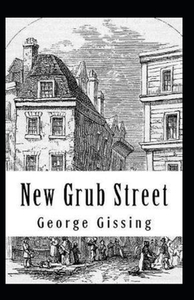Take a photo of a barcode or cover
A dense and ultimately horribly depressing novel about a struggling writer who loses (or has to sell off) everything. Actually quite a page turner for me, but, then again, I do enjoy tomes of British Literature.
challenging
reflective
sad
slow-paced
Plot or Character Driven:
Character
Strong character development:
Yes
Loveable characters:
No
Diverse cast of characters:
No
Flaws of characters a main focus:
Yes
British people in the latter half of the nineteenth century actually expected to be able to make a living as writers (lol). The result is a tension between artistic integrity and crass marketability, as exemplified by the amoral Jasper Milvain and the idealistic Edward Reardon. "You have to become famous before you can secure the attention which would give fame," Milvain declares. His success is due as much to networking and hobnobbing as it is to his actual writing. The failure of Alfred Yule's career and his subsequent poverty is actually attributed to having an "unpresentable wife" from a working-class background who doesn't have the right accent. Reardon had the right wife but alas, his standards were too high and he simply couldn't write a hack novel if he tried. (From a modern perspective, I couldn't help but wonder why Amy couldn't get a damn job when her family was facing financial ruin. Good grief.) I was reading [b:Plum Bun: A Novel without a Moral|636454|Plum Bun A Novel without a Moral|Jessie Redmon Fauset|https://images.gr-assets.com/books/1320503521s/636454.jpg|2290082] at the same time as this book and couldn't help but notice all the parallels between social class in Britain and race in the United States in roughly the same era.
New Grub Street is also very much a realist novel that provides a rich, detailed portrait of a certain subculture in 1880s London. Its characters are ordinary people, yet their feelings, motivations, and personalities are intimately explored and developed such that none are ever unsympathetic, regardless of how unpleasant their behavior. There is no central moral or lesson beyond a proto-postmodernism that calls attention to the institutionalized privileges and prejudices behind how society judges art and literature and determines what voices will be heard.
The book was originally published in three volumes, as was standard at the time in order to wring the most money out of consumers, so at 661 pages it is fairly overlong for its premise by our standards.
New Grub Street is also very much a realist novel that provides a rich, detailed portrait of a certain subculture in 1880s London. Its characters are ordinary people, yet their feelings, motivations, and personalities are intimately explored and developed such that none are ever unsympathetic, regardless of how unpleasant their behavior. There is no central moral or lesson beyond a proto-postmodernism that calls attention to the institutionalized privileges and prejudices behind how society judges art and literature and determines what voices will be heard.
The book was originally published in three volumes, as was standard at the time in order to wring the most money out of consumers, so at 661 pages it is fairly overlong for its premise by our standards.
challenging
dark
reflective
slow-paced
Plot or Character Driven:
A mix
Strong character development:
No
Loveable characters:
No
Diverse cast of characters:
No
Flaws of characters a main focus:
Yes
The last 100 pages are sort of insane, and the ending is wildly abrupt, but Gissing's novel is full of commentary on the eternal art v. commodity debate that is, of course, prescient for anybody looking at the publishing industry of today. The nepotism, the marketing schemes, the classism, it's all there now as it was then, which depresses as one would expect.
medium-paced
challenging
emotional
reflective
sad
slow-paced
Plot or Character Driven:
Character
Strong character development:
Yes
Loveable characters:
Yes
Diverse cast of characters:
Yes
Flaws of characters a main focus:
Yes
Another book too big for its own good. Gissing writes brilliantly but even that couldn't help this book from seeking dragged particularly in third part. In fact, the three part format itself might be in response to the commercial convention of the time, rather than something that sprung out of author's own aesthetic. Gissing may have divided himself into different authors who form the circle of characters in book. My favorite character is Jasper Milvain whose cynical ideas about how to succeed as an author seems to be still true. What makes him more interesting though is that he knows how unlikable his views make him and, despite not wishing to be disliked, still keeps expressing them. His cynicism contrasts idealism of others particularly Edward. Marian Yule makes another important reflection where she wonders if there aren't too many books written already.
Plot or Character Driven:
Character
Strong character development:
Complicated
Loveable characters:
No
Diverse cast of characters:
Yes
Flaws of characters a main focus:
Complicated
wow i am honestly weirdly passionate about how great this book is





